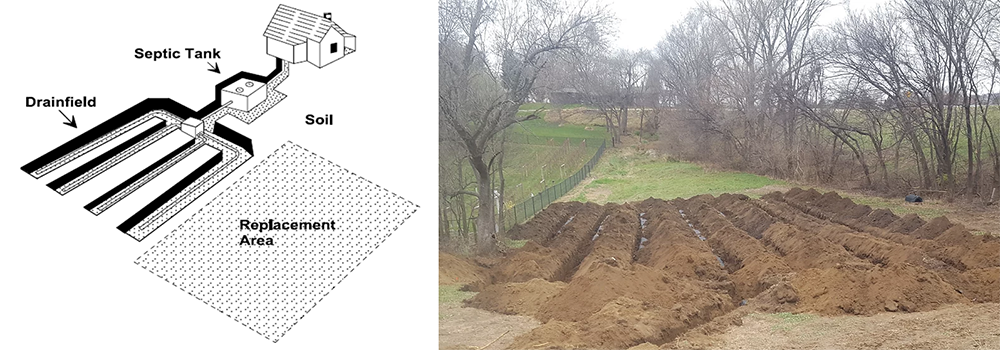Septic Systems
Septic Permits and Instructions
Septic permits can be completed online!
A typical septic system has four components:
- pipe from home
- septic tank
- drainfield
- soil

Wastewater moves from the septic tank to secondary treatment where it is naturally broken down by soil microbes, used by plants, and enters the atmosphere through evapotranspiration.
Because septic systems do not last forever, new lots are required to have room for a replacement system. Older subdivisions typically are very small lots with no planned replacement area for when the septic system fails. Because of the limited size of these lots – replacing the septic system could require additional measures such as a pre-treatment system or septic variance from the Board of Health.
- Iowa Administrative Code 567 Ch. 69 - Private Sewage Disposal Systems
- Pottawattamie County Code Chapter 5.50 - Onsite Wastewater Treatment
Replacing Septic Systems
Permits are required for all new septic installations or repairs. The Environmental Health Inspectors perform site evaluations and approve the design before the permit is issued; inspect the final product before it is covered up; and issue a certificate of completion to the owner. This assures that the septic system is designed to state standards.
Septic systems must be replaced when they have failed, when they’re discharging effluent to the surface of the ground, and when they are illegal systems such as cesspools.
Time of Transfer Inspections
All buildings served by a private sewage disposal system must have a Time of Transfer Inspection completed before the property can be transferred to a new owner. (For certain exceptions, see IAC 567 Ch. 69). Time of Transfer Reports are reviewed by the Environmental Health Inspectors to ensure the system is properly functioning. If a septic system is not properly functioning, it may need to be replaced before the property can transfer.
Financial Assistance Available
The On-site Wasterwater Assistance Program (OSWAP) is available to replace inadequate or failing septic systems in the form of low-interest loans through participating lenders to rural homeowners.
Back · Environmental Health


